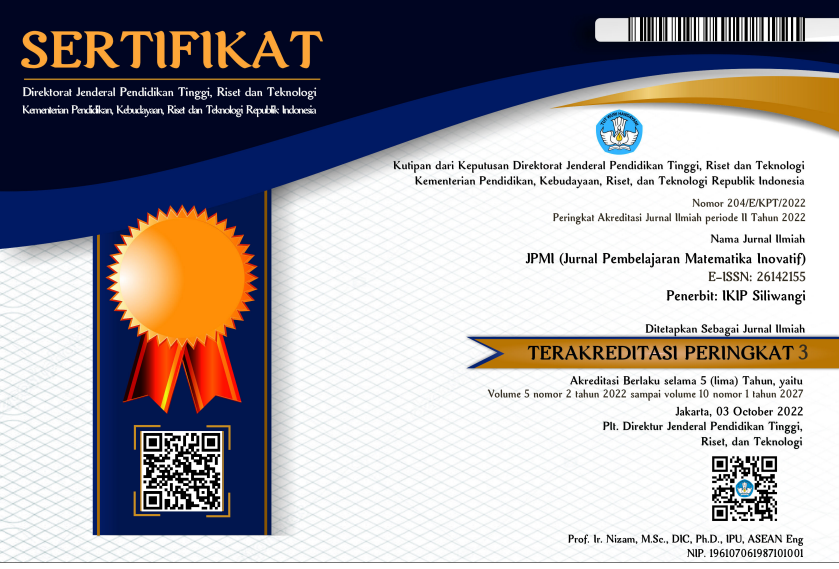Studi kasus: Analisis kriteria konvergensi iterasi sederhana berdasarkan tebakan awal
DOI:
https://doi.org/10.22460/jpmi.v6i6.15521Keywords:
Kriteria Konvergensi, Iterasi Sederhana, Tebakan AwalAbstract
The simple iteration material in the numerical methods course is material related to functions and derivatives. Apart from this, simple iteration material requires one or two initial guesses that do not require bracketing the roots. This method will produce a root approximation as a solution, which will show convergent or divergent results. The convergence criteria are influenced by the derived results and the initial guesses provided. Because of this, this research aims to analyze the results of student answers to prove the convergence criteria of a given simple iterative problem. The method used in this research is a case study, analyzing the results of the answers of five randomly selected students studying numerical methods courses. Based on the results of the analysis of the convergence criteria based on initial guesses, it was concluded that only 5 students could prove the convergence criteria correctly. In general, students made mistakes in deriving algebraic functions, carried out division operations, and incorrectly determined the convergence criteria because they only proved the possibility of the function. given so that students only focus on convergence criteria without carrying out iterative analysis.
References
Atmika, I. K. A. (2016). Diktat mata kuliah metode numerik. In Universitas Udayana. Jurusan Teknik Mesin - Fakultas Teknik - Universitas Udayana.
Fransiska, R., Anwar, A., & Syahjuzar, S. (2022). Kesulitan siswa dalam menyelesaikan soal turunan fungsi aljabar di sma plus al-’athiyah tahfidz al-qur’an banda aceh. Jurnal Ilmiah Mahasiswa Pendidikan Matematika, 7(2), 140–151. http://www.jim.unsyiah.ac.id/pendidikan-matematika/article/view/20681%0Ahttp://www.jim.unsyiah.ac.id/pendidikan-matematika/article/download/20681/10061
Hasanah, H. (2019). Analisis kesulitan mahasiswa dalam menyelesaikan soal turunan fungsi aljabar. Jurnal InTent, 2(1), 76–84.
Hasyim, M., & Andreina, F. K. (2019). Analisis high order thinking skill (HOTS) siswa dalam menyelesaikan soal open ended matematika. FIBONACCI: Jurnal Pendidikan Matematika Dan Matematika, 5(1), 55. https://doi.org/10.24853/fbc.5.1.55-64
Lepertery, M. E., Ayal, C. S., & Palinussa, A. L. (2022). Analisis kesulitan siswa dalam menyelesaikan soal turunan fungsi aljabar ditinjau dari kecerdasan emosional. Jurnal Pendidikan Matematika Unpati, 3(2), 50–57. https://doi.org/10.31537/laplace.v5i2.761
Munir, R. (2015). Metode numerik, Revisi Empat. Informatika.
Prihandika, Y. A., Hidayah, I., Susilo, B. E., & Dewi, N. R. (2023). Analisis kesalahan siswa dalam menyelesaikan soal matematika materi limit fungsi aljabar. Prosising Seminar Nasional Pascasarjana Universitas Negeri Semarang, 961–966. https://journal.ikipsiliwangi.ac.id/index.php/jpmi/article/viewFile/3849/1793
Rahmawati, N. D., & Roesdiana, L. (2022). Analisis kemampuan pemahaman konsep matematis siswa SMA pada materi turunan fungsi aljabar. Jurnal Edukasi Dan Sains Matematika (JES-MAT), 8(1), 17–32. https://doi.org/10.25134/jes-mat.v8i1.5579
Ruslan, A. ., & Santoso, B. (2013). Pengaruh pemberian soal open-ended terhadap kemampuan penalaran matematis siswa. Kreano, 4(2), 138–150.
Wahyuningsih, S. (2013). Metode penelitian studi kasus. UTM Press.
Downloads
Published
Issue
Section
License
Copyright (c) 2024 JPMI (Jurnal Pembelajaran Matematika Inovatif)

This work is licensed under a Creative Commons Attribution-ShareAlike 4.0 International License.
The author is responsible for acquiring the permission(s) to reproduce any copyrighted figures, tables, data, or text that are being used in the submitted paper. Authors should note that text quotations of more than 250 words from a published or copyrighted work will require grant of permission from the original publisher to reprint. The written permission letter(s) must be submitted together with the manuscript.
















